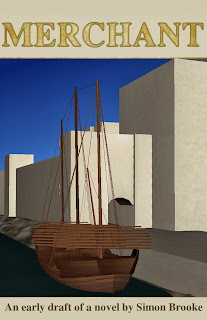Au tour de ma tête, more or less.
OK, so, my friend Janet got me on this blog tour thing. Thing is, I'd like to say I'm not writing these days. Much. I've got a new and demanding job, and I'm dog tired all the time. I've also got a lot of things I ought to be doing — not least, this year is Scotland's chance of independence, a chance I've been waiting for and claiming to be working for for forty years. But I'm not out on the streets campaigning, because I'm too tired.
Or so I say.
And yet, I came back to my lodgings on Monday night, sat down, and wrote three thousand words. I got up this morning at sparrow fart, and wrote another five hundred before wolfing down some breakfast and running out to work.
At fifty thousand words

A week ago tonight I tweeted:
"New novel now up to 42k words in only two months — 670 words/day average — despite new job. Very surprised. Don't know where it comes from!"
Buy the ASA a helmet. They need one!
Oh, I am so tired of the cycle helmets issue. I wish it would just go away. Cycle helmets are designed to stop you getting concussion if you fall off your bike at low speeds. They aren't designed to help if you get hit by a car, and they won't. They're not even nearly strong enough, nor could they be made so.
Of course, most people don't know that. Most people think that wearing an inch of polystyrene will stop a ton of metal. They wouldn't believe it if they thought about it, butthey don't think about it.
Modelling the ships

Yes, really I have been working on the novel today, but the actual text is not much further forward. I'm now up to 20,500 words, which is progress but not fast. However, I've been doing a lot of background research on speeds of camel caravans, speeds of iron age sailing ships, and other details; and I've been working on my calendar, to make sure all the right characters can plausibly be where I need them to be at the right dates, given the transport they have available to them.
Interestingly, this exercise has brought back to mind (and validated) my previous essay, 'The spread of knowledge in a large game world'. Because of the speed of the ships (more below) my protagonist sails from the northern city where he's spent the early summer thirty five days after his home city has been conquered — but he does not know of it, because there's no plausible way for news to reach him. On his way he visits The City at Her Gates, and there he may plausibly pick up news of the conquest of his home — but it's equally possible that he won't, since although the news could have reached there if a convenient ship has happened to make the passage, it's possible that it hasn't.
In praise of LuminusWeb
Well, I've just finished my first in-anger, for-a-paying-customer, website in Clojure. Essentially it's just a very simple CRUD system; it landed on my desk last week in a rush because the agency which had been supposed to be building it had drawn some pretty pictures and then thrown their hands up in the air and said 'this is too hard'.
It wasn't a requirement it be written in Clojure; in fact, until I tacked a credits line on the bottom of the pages saying 'Powered by Clojure' I don't think the customer knew that it was. I estimated four days on a fixed price basis; I think this was fair. In fact it took six, but I worked over the weekend so the project hasn't been delayed by my overrun.
Some of the overrun was unforeseen — the agency who abandoned the job had built the forms in JotForm, and they proved to be so horrible that I had to rewrite them from scratch — the HTML was bizarrely bad, and none of the field names were meaningful. Also, the pretty pictures drawn by the agency were all fixed size — they didn't flow or scale. I admit I'm a snob, but if a website is going to be identified as my work I want it to be right. So now, it is right (well, mostly; the navigation does something ugly and not very usable if you shrink a desktop browser window too small, but I haven't yet found a workaround for that which fits with the design). Now, it uses media queries to distinguish smartphones, tablets and desktops, and serves the appropriate CSS for each. Yes, that cost me time, too, but in my opinion it's worth it.

